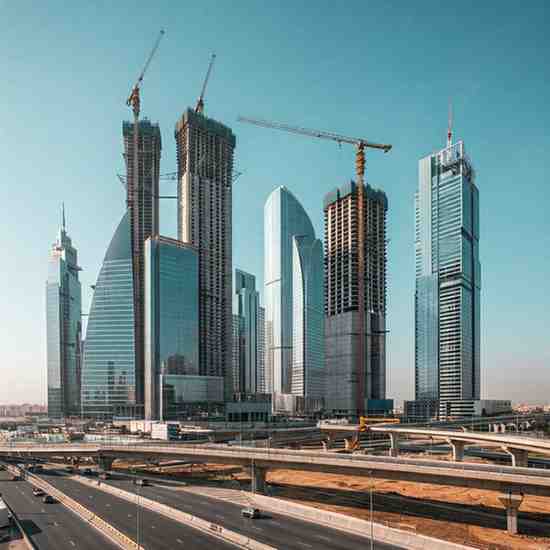
Top 5 Infrastructure Stocks to Buy in India in 2025
Top 5 Infrastructure Stocks to Buy in India in 2025
India’s aspiration to become a $5 trillion economy heavily depends on the growth of its infrastructure sector. With initiatives like the National Infrastructure Pipeline (NIP), Make in India, and the Production-Linked Incentive (PLI) scheme, the government is laying a strong foundation for this sector’s growth. For investors, this presents a golden opportunity to tap into a transformative market.
Thank you for reading this post, don't forget to subscribe!This guide explores the top 5 infrastructure stocks to watch in 2025, highlighting their strengths, financial metrics, and potential to ride the wave of India’s infrastructure boom.
Best Infrastructure Stocks in 2025: An Overview
Here’s a list of the top infrastructure stocks poised for growth:
1. IRB Infrastructure Developers Ltd
- Why Invest: A leader in road and highway construction, IRB is also expanding into airports and real estate. Its diverse portfolio and proven track record make it a reliable pick.
- Key Metrics:
- EPS: ₹1.37
- ROE: 8.46%
2. Praj Industries Ltd
- Why Invest: Known for sustainable solutions in bioenergy, water purification, and waste treatment, Praj’s focus on green technology aligns with the global shift toward sustainability.
- Key Metrics:
- EPS: ₹16.15
- ROE: 22.88%
3. Ircon International Limited
- Why Invest: Specializing in large-scale infrastructure projects, particularly railways and highways, this state-owned company benefits from government backing and expertise in complex projects.
- Key Metrics:
- EPS: ₹9.03
- ROE: 14.09%
4. NCC Limited
- Why Invest: With projects in roads, buildings, irrigation, and mining, NCC excels in handling turnkey contracts and public-private partnerships, offering a well-rounded investment opportunity.
- Key Metrics:
- EPS: ₹12.13
- ROE: 10.83%
5. NBCC (India) Limited
- Why Invest: A government-owned enterprise excelling in Project Management Consultancy, EPC contracts, and real estate. Its involvement in key government projects ensures stability and growth.
- Key Metrics:
- EPS: ₹1.50
- ROE: 18.18%
The Future of India’s Infrastructure Sector
India’s infrastructure sector is on a growth trajectory, driven by bold government initiatives and rising private investment. Key drivers include:
- Increased Government Spending: India aims to become the world’s third-largest construction market, backed by sustained public investment.
- Urbanization: Rapid urban growth demands continuous infrastructure upgrades to meet housing, transportation, and service needs.
- Technological Advancements: Integrating advanced technology boosts efficiency and sustainability, opening doors for innovative projects.
Types of Infrastructure Systems
Understanding infrastructure categories helps make informed investment decisions:
- Soft Infrastructure: Services like education, healthcare, and financial systems.
- Hard Infrastructure: Physical assets like roads, railways, and bridges.
- Critical Infrastructure: Vital sectors such as energy, telecom, and public health.
How to Select the Best Infrastructure Stocks in India in 2025
To choose the right stocks, consider these factors:
- Company Fundamentals: Study financial statements, profitability, and growth potential.
- Management Quality: Evaluate leadership expertise and strategic vision.
- Project Execution: Assess efficiency in meeting project deadlines.
- Financial Health: Look at metrics like debt-to-equity ratio and interest coverage.
Key Considerations for Investing in Infrastructure Stocks in India
Before diving in, keep these tips in mind:
- Market Demand: Align investments with urbanization and economic trends.
- Government Policies: Monitor regulatory changes and public spending.
- Sector-Specific Risks: Be aware of political or economic uncertainties.
- Competitive Landscape: Understand the company’s market positioning.
- Long-Term Perspective: Infrastructure investments often yield rewards over the long run.
Conclusion
Investing in infrastructure stocks in 2025 offers an exciting opportunity to be part of India’s growth story. By focusing on companies with strong fundamentals, capable leadership, and a robust market presence, investors can position themselves for substantial returns.
Remember, diversification and a long-term outlook are key. Always consult a financial advisor before making investment decisions.
Frequently asked Questions (FAQs): Investing in Top Infrastructure Stocks to Buy in India in 2025
What are the top infrastructure stocks to buy in India in 2025?
The top infrastructure stocks to consider for 2025 include:
- IRB Infrastructure Developers Ltd: A leader in road and highway construction, expanding into airports and real estate.
- Praj Industries Ltd: Known for green technology in bioenergy and water purification.
- Ircon International Limited: Specializes in railways and highways, benefiting from government backing.
- NCC Limited: Excels in diverse projects like roads, buildings, and public-private partnerships.
- NBCC (India) Limited: A government-owned enterprise involved in key public sector projects.
Why is the infrastructure sector crucial for India’s growth?
The infrastructure sector is a cornerstone for India’s economic development, supporting the country’s goal of becoming a $5 trillion economy. Government initiatives like the National Infrastructure Pipeline (NIP), Make in India, and the Production-Linked Incentive (PLI) scheme are driving growth, creating a robust foundation for investments in roads, railways, urban development, and green technology.
What factors should I consider before investing in infrastructure stocks in India?
Key considerations include:
- Financial health: Check metrics like EPS, ROE, and debt-to-equity ratio.
- Company fundamentals: Study profitability and growth potential.
- Management quality: Look at the leadership’s expertise and vision.
- Project execution capabilities: Assess the efficiency in meeting deadlines.
- Market demand: Align investments with urbanization and economic trends.
Are infrastructure stocks good for long-term investment?
Yes, infrastructure stocks typically offer long-term growth potential as they benefit from:
- Steady government spending on large-scale projects.
- Rising urbanization, which drives demand for improved infrastructure.
- Long project lifecycles, which often translate to consistent revenues over time.
How can I identify high-growth potential infrastructure stocks in India?
To spot high-growth stocks:
- Analyze financial performance (e.g., revenue growth, profitability).
- Look for companies aligned with government initiatives like NIP.
- Assess their market positioning and ability to execute large projects efficiently.
- Study their focus on innovation and sustainability.
What are some misconceptions about investing in infrastructure stocks?
- Myth: Infrastructure investments are too risky due to government dependency.
Fact: While policies impact the sector, government backing often ensures stability and funding. - Myth: Infrastructure stocks don’t offer quick returns.
Fact: While these are generally long-term investments, well-chosen stocks can provide steady growth and dividends.
What role does urbanization play in the growth of infrastructure stocks?
Urbanization drives the demand for housing, transportation, and services, making it a key growth factor. Companies engaged in building roads, railways, and urban housing projects are well-positioned to capitalize on this trend.
How do government policies impact infrastructure investments?
Policies like tax incentives, subsidies, and public spending (e.g., on smart cities and rural connectivity) directly influence infrastructure growth. Monitoring policy changes can help investors identify opportunities.
Is it better to invest in government-owned infrastructure companies?
Government-owned companies, like NBCC and Ircon, often enjoy stable funding and guaranteed projects, making them less risky. However, private players like IRB Infrastructure can offer higher growth potential due to diversification and agility.
What are the risks associated with infrastructure stock investments?
Risks include:
- Political or regulatory changes: These can delay projects or affect profitability.
- Economic downturns: Reduced public or private spending can impact revenues.
- Project execution delays: Can lead to cost overruns and reduced investor confidence.
How can I diversify my portfolio with infrastructure stocks?
Diversify by investing across:
- Sub-sectors: Include roads, railways, green energy, and urban development.
- Company types: Combine government-owned and private companies.
- Project scales: Invest in companies handling both large and small-scale projects.
Also Read: Diversifying Your Portfolio with India’s Steel Sector
Where can I open a Demat account to start investing in infrastructure stocks?
You can open a Demat account with platforms like GWC India to start your investment journey in infrastructure stocks. They provide user-friendly interfaces and robust research tools for informed decision-making.
How does sustainability influence infrastructure investments in India?
Sustainability is a growing focus, with companies like Praj Industries leading in green technology. Government initiatives and global trends toward renewable energy and sustainable urban development also boost opportunities in this area.
Can infrastructure stocks provide regular income through dividends?
Yes, some infrastructure companies, especially those with stable revenues, offer regular dividends. Look at dividend-paying stocks like NCC or NBCC for consistent income.
How can I stay updated on the best infrastructure stocks to invest in?
Follow credible financial news platforms, government updates, and blogs like this one. Regularly review company reports and seek advice from financial experts.
Related Blogs:
Best Steel Stocks in India in 2025
Top 5 Steel Stocks in India: A Guide for Investors in 2025
Best Steel Stocks in India
Diversifying Your Portfolio with India’s Steel Sector
Best Metal Stocks in India
Top 5 Metal Stocks in India
Best Aluminum Stocks in India
Disclaimer: This blog post is intended for informational purposes only and should not be considered financial advice. The financial data presented is subject to change over time, and the securities mentioned are examples only and do not constitute investment recommendations. Always conduct thorough research and consult with a qualified financial advisor before making any investment decisions.

